Steve Flowers: Don Siegelman Meets Big Jim Folsom

We are continuing this week with our summer series on Big Jim Folsom – Alabama’s most colorful governor. Those of us who grew up in and around Alabama politics have coined a descriptive term for a person who is obsessed with seeking political office constantly and tirelessly without reservation or concern for their physical, mental, or financial welfare. They will run for high-elected office at all costs. The term we use to describe those people is named for the man who best exemplified that obsession, George Wallace. Therefore, someone who is driven by obsession to win high public office has the “George Wallace Syndrome.” The Alabama baby boomer who was eaten up with George Wallace Syndrome more than any other I know was Don Siegelman. Siegelman ran nonstop beginning from the time he was a student at the University of Alabama in the 1960s. He was successful. He was President of the Student Government at Alabama and went on to become Alabama’s Secretary of State, Attorney General, Lieutenant Governor, and finally, his life’s dream of Governor. There is an old political saying that you don’t ever want to get into a race with someone who wants it more than you and will outwork you. Siegelman was never outworked. He was relentless and focused on the ultimate prize that many a young politician in Alabama aspired to, and that’s the governor’s chair. He captured the brass ring. Siegelman reminded me so much of George Wallace; he truly deserves the award for having the Wallace Syndrome. He and Wallace were so consumed with politics and being governor that neither one of them could tell you what they were eating when you had lunch with them. Eating was a sideline to any political discussion they were having and calling lunch. They ate because they had to eat to survive. Siegelman was always a little more liberal than most Alabamians. Therefore, he grew up admiring the more progressive Alabama political icons. He admired our progressive New Deal Democrats, such as Lister Hill, John Sparkman, and Carl Elliott. However, the utmost idol for young liberal politicians of my era was James E. “Big Jim” Folsom. Big Jim was truly a progressive on fiscal and social issues. Siegelman had a remarkedly similar career and educational background as Bill Clinton. Both were almost the same age, both received undergraduate degrees from their state universities, both left college and went to prestigious law schools – Clinton to Yale and Siegelman to Georgetown. They both went on to do postgraduate work at Oxford in England. Then they both started running for office right away. Clinton ran for Congress, then Governor of Arkansas. Siegelman ran for Secretary of State and then on up the Alabama political ladder to Attorney General, Lieutenant Governor, and Governor. As Siegelman was beginning his first foray into Alabama politics, I will share with you a funny story that I call the “Don Siegelman meets Big Jim story.” Siegelman was campaigning hard all day for Secretary of State in early 1978 and wound up his day late in Cullman. Big Jim, in his later years, camped out at a truck stop along the interstate in Cullman. Big Jim was drinking coffee, and Siegelman spotted his lifelong hero and liberal idol, Big Jim, and went over to introduce himself. Siegelman gave Big Jim his spiel and what he was doing, and how his campaign for Secretary of State was going. He gave Big Jim the story of his pedigree concerning all of his educational degrees: University of Alabama Student Government President, Georgetown Law School, and Oxford in England. Big Jim listened intently to the young politician and sipped on his coffee. Now, you have to realize that even though Big Jim was a progressive on fiscal and race matters, he was pretty down home when it came to country politics, patronage, and home-spun talking to folks. Big Jim was also pretty pragmatic and plain-spoken. He said, “Boy are you asking my advice about your campaign?” Siegelman said, “Sure I am Governor.” Big Jim said, “Well, first of all, you need to change your name. Ain’t nobody in Opp going to vote for some boy named Siegelman. First of all, you can’t say it. Secondly, it don’t sound like a good regular Alabama Baptist or Methodist name, and you better tell folks you went to school at Oxford High School in Calhoun County and not someplace in England. Thirdly, don’t you know you can’t steal any money in that job?” See you next week. Steve Flowers is Alabama’s leading political Columnist. His weekly column appears in over 60 Alabama newspapers. He served 16 years in the state legislature. Steve may be reached at www.steveflowers.us.
Former HealthSouth CEO Richard Scrushy denies hiding millions amid ongoing scandal
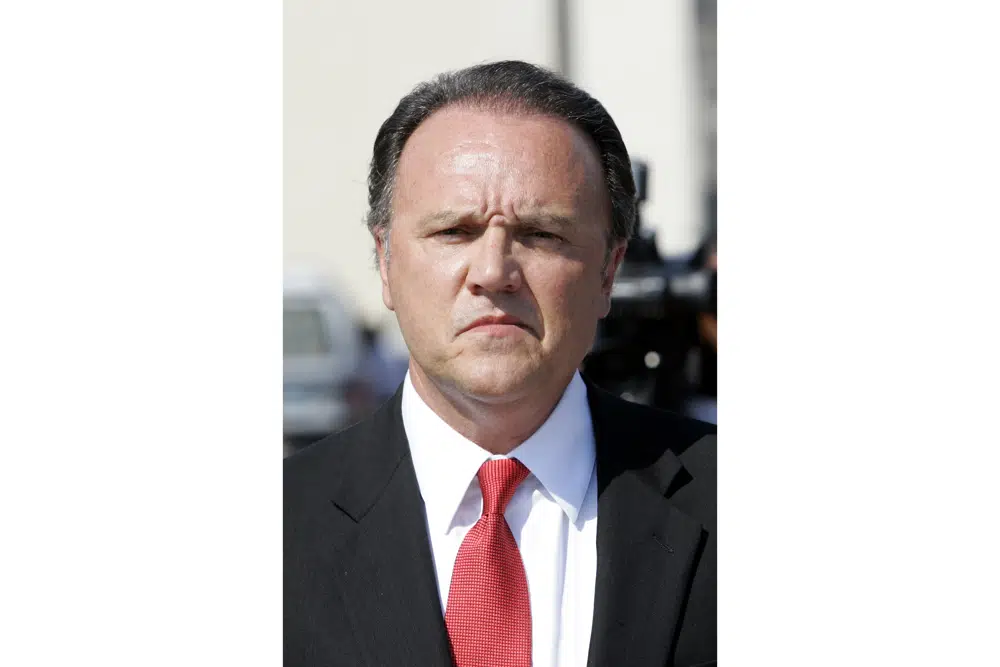
The man who once led HealthSouth, a huge provider of outpatient rehab services, has been ordered to turn over records related to a bank account that lawyers say he’s using to hide millions. In a seven-page order against Richard Scrushy, the Birmingham-based company’s former chief executive officer, John England Jr., acting as special master in the case, also issued an injunction against any money being transferred out of the account in question, AL.com reported. The ruling Tuesday came after lawyers representing the plaintiffs in a 2009 civil verdict contended that Scrushy has been hiding money that could be used to pay some of the more than $2.87 billion in damages he still owes as result of the HealthSouth scandal. The government contends Scrushy and other executives inflated earnings by $2.7 billion from 1996 through March 2003 to make it appear HealthSouth was meeting expectations of Wall Street analysts. Lawyers alleged Scrushy has written checks totaling $7.3 million on an account in the name of convicted felon Eddie Briskett, who is currently serving time in the Alabama Department of Corrections for various convictions, including property theft, burglary, and assault. England contends Scrushy, or someone connected to him, has control of the account and has actively used it. Scrushy denies any wrongdoing and said he welcomes any disclosures, since “they will find nothing,” the news site reported. “It’s totally made-up, false information that never should have been put out,” Scrushy said. In 2007, Scrushy was sentenced to nearly seven years in prison for bribery involving former Gov. Don Siegelman. While serving his sentence in a Texas prison, a civil court found him liable for the HealthSouth accounting fraud. After serving about five years of his sentence, Scrushy was released from prison. According to England’s order, Scrushy contends he is unemployed and has no assets other than Social Security. Lawyers for the plaintiffs say he is conducting business through other entities owned by friends and family. According to the ruling, Scrushy has “exchanged thousands of text messages” with a number associated with Briskett and written checks totaling $7.3 million on the account, including two checks to himself totaling $3 million. However, those checks were never deposited in any account previously disclosed by Scrushy, the order states. In addition, England references a 2020 letter to the Alabama Bureau of Pardons and Paroles by an associate of Scrushy, explaining that Briskett has an investment portfolio of about $7.1 million. “The evidence presented suggests that Mr. Scrushy may have an interest in the account or in some or all of the proceeds of the account,” the order reads. “At minimum, it appears that Mr. Scrushy or someone acting in concert with him opened the account in Briskett’s name and that Mr. Scrushy has control of the account.” Scrushy told the news site that he has known Briskett for 20 years through his prison ministry and has exchanged text messages with Briskett’s sister, mainly to set up telephone conversations. The checks, he said, were “kind of a joke” between the two of them. “He’s one of the gentlemen that I’ve helped, being a friend and minister,” he said. “I’ve never signed on any bank account of his. There’s zero truth to any of that. I’ve never been involved with Eddie Briskett on any account, period. I’ve never taken a dime from Eddie Briskett.” Scrushy said the court filings in the case are a continued harassment to him and his family. “I’ve never seen such abuse and waste in my life,” he said. “I told the judge yesterday to let those attorneys go and discover anything they want. There is nothing to it.”
2 former Alabama governors from opposite sides of the political aisle express doubts over executions

Two former Alabama governors, from opposite sides of the political aisle, wrote in an opinion piece that they are now troubled by the state’s death penalty system and would commute the sentences of inmates sentenced by judicial override or divided juries. Former Gov. Don Siegelman, a Democrat, and former Gov. Robert Bentley, a Republican, who both oversaw executions while in office, penned the Tuesday opinion piece for The Washington Post. The governors said that have both come “to see the flaws in our nation’s justice system and to view the state’s death penalty laws in particular as legally and morally troubling.” “We missed our chance to confront the death penalty and have lived to regret it, but it is not too late for today’s elected officials to do the morally right thing,” the governors wrote. Bentley and Siegelman each let eight executions go forward while they were in office, according to a list maintained by the Alabama Department of Corrections. The governors said they are particularly concerned that a large number of the state’s death row population was sentenced to death by either divided juries or over a jury’s recommendation. Alabama, in 2017, became the last state to end the practice of allowing judges to override a jury’s sentence in a capital case and send a person to death row when a jury recommended life imprisonment — a practice that critics argued interjected election-year pressure into sentencing decisions. But the change was not retroactive and did not impact inmates already sentenced to death by judicial override. “As governors, we had the power to commute the sentences of all those on Alabama’s death row to life in prison. We no longer have that constitutional power, but we feel that careful consideration calls for commuting the sentences of the 146 prisoners who were sentenced by non-unanimous juries or judicial override, and that an independent review unit should be established to examine all capital murder convictions,” the two governors wrote. Only four states out of the 27 that allow the death penalty do not require a unanimous jury to sentence an inmate to death. Alabama allows a death sentence with 10-2 decision in favor of execution. Florida Gov. Ron DeSantis last month signed legislation ending that state’s unanimous jury requirement and allowing death sentences when at least eight jurors are in favor. Missouri and Indiana let a judge decide when there is a divided jury. The governors cited statistics from the Death Penalty Information Center that one person on death row has been exonerated for every 8.3 executions. Applying that exoneration rate to the 167 people on Alabama’s death row, Siegelman said would suggest as many as 20 inmates could have been wrongfully convicted. “We all should agree that if the state is going to be in the business of killing people, that we should make sure that we have the right person,” Siegelman told The Associated Press in a telephone interview Tuesday night. Siegelman said after reviewing cases that he is now personally haunted by one of the eight executions that happened during his time as governor. Freddie Wright was put to death in Alabama’s electric chair in 2000 after being convicted of killing a couple during a robbery. Siegelman declined to stop the execution, saying at the time that the “death penalty is appropriate in this case.” Twenty-three years later, Siegelman said that he now believes Wright “was wrongfully charged, prosecuted and convicted for a murder he most likely did not commit.” Siegelman said that he “never felt comfortable with the death penalty” but that his views have evolved over the years, at least partly sparked by his own criminal conviction. The last Democratic governor in a state now dominated by Republicans, Siegelman was convicted of federal bribery and obstruction of justice charges largely related to his appointment of a campaign donor to a state board. Siegelman, who has maintained his innocence, said he came to see the system as flawed. Republished with the permission of The Associated Press.
Steve Flowers: Two Jefferson County legends retire

As we begin to celebrate the Christmas season and close out 2022, allow me to share the story of two great Jefferson County/Alabama political legends. Alabama Supreme Court Justice, Mike Bolin, is retiring at the end of the year from the state’s highest judicial tribunal. Judge Bolin is a young 72. He would not have retired and would have sought and been elected to another six-year term if it were not for an antiquated state law that disallows someone to run for a judgeship in the state after age 70. Justice Bolin is one of the most popular and well-respected judges in Alabama. He is a big man, physically and figuratively. He is beloved throughout the state, especially in his native Jefferson County. Mike Bolin was born in and is a lifelong resident of Jefferson County. He attended elementary and high school in Homewood and graduated from Shades Valley High School in 1966 with honors. He stayed in Homewood for college and graduated from Samford University with a degree in Business Administration in 1970. He then continued on and got his law degree from Samford University’s Cumberland School of Law. He graduated from law school in 1973. He was on the Dean’s list and was associate editor of the Law Review. Judge Bolin was a practicing attorney in Birmingham from 1973 through 1988. In 1988 he was first elected Probate Judge of Jefferson County. He was reelected Probate Judge of Alabama’s largest County in 1994 and again in 2020. He served in that position until his election to the Alabama Supreme Court in January 2004. He began serving on the Supreme Court in January 2005. Thus, at the end of his tenure in six weeks, he will have served 18 years on the high court. Justice Bolin and his wife Rosemary have one daughter, Leigh Anne. Mike Bolin is known and respected for his integrity, humility, and kindness. Another Jefferson County legend, Tony Petelos, retired from public service last year. Tony is a lifelong resident of Jefferson County and is a real American and Alabama success story. Tony Petelos has carved out a niche in Jefferson County and Alabama political history. His parents are first-generation immigrants. His family fled Greece when Mussolini and later Hitler invaded and decimated Greece. His father fought in the Greek Army and then later became a member of the United States Army. Tony is the youngest of nine children. He had five siblings born in Greece; one died in the war. His father made it to the United States in 1947. His mother arrived in 1950. They had four sons born in America. Tony is the youngest. His father and mother settled in Ensley. Tony’s father was in the construction business and became quite successful. Tony and his three older brothers joined their father in the family business. He earned his college degree at UAB while working during the day. He met his wife Teresa while both were studying at UAB. She became a Jefferson County Circuit Judge and served 18 years on the bench. Tony began his political career in 1986. He defeated an incumbent and became one of only 14 Republicans in the 105-member House of Representatives. He was reelected in 1990 and again in 1994. In 1997, after 11 years in the House, Governor Fob James named Tony Commissioner of the Department of Human Resources for the State of Alabama. He was reappointed Human Resources Commissioner by Governor Don Siegelman in 1998 and served through 2001. In 2004, Tony Petelos was elected Mayor of the City of Hoover, one of the state’s largest cities. He served eight years as mayor and earned a reputation as one of the state’s premier municipal administrators. In 2011, the Jefferson County government was in chaos, to say the least. The County Commission lured Tony away from Hoover to be the Administrator of Jefferson County’s government. He cleaned up the corruption and financial problems and spent ten years in that position. He retired about this time last year at 69. He and his wife, Judge Petelos, are doing well. They live in the same home they have lived in for the last 24 years in Hoover. They have two adult daughters, who they are very proud of. Tony’s story is a great Alabama political success story. Happy Holidays. Steve Flowers is Alabama’s leading political columnist. His weekly column appears in over 60 Alabama newspapers. Steve served 16 years in the state legislature. Steve may be reached at www.steveflowers.us.
Jimmy Blake addresses Libertarians in Homewood

Libertarian nominee for Governor of Alabama Dr. James “Jimmy” Blake addressed the Libertarians of Greater Birmingham at a dinner event at Jim’ N Nick’s barbecue restaurant in the greater Homewood area on Tuesday night. “I am a former chairman of the (Libertarian) Party,” Blake said. “I have been involved with the Libertarians really since the 1970s. I was chairman of the Libertarian Party when I was elected to the city council. I am very proud of some of the things we accomplished back then.” Blake is a career doctor, an Air Force veteran, and a former Birmingham City Councilman. “Our party has not been on the ballot since 2002,” Blake said. “Then John Sophocleus got more votes than the Republican margin of victory over Don Siegelman, and the Republicans and Democrats agreed that they did not want competition.” Sophocleus finished third in the 2002 gubernatorial election behind then-Congressman Bob Riley and then Governor Siegelman. Sophocleus is the 2022 Libertarian nominee for U.S. Senate. “We have, I think, 65 candidates on the November ballot, and 50 of them are only running against a Democrat or a Republican,” Blake said. “Without them, the voters would not have any choice in those races.” Blake attacked both of the major political parties. “I call them the blue ticks and the red ticks because they are both sucking us dry,” Blake said of the Democrats and the Republicans. “One thing that they agree on is that they don’t want competition.” Alabama law requires a political party that did not have a candidate get 20 percent of the vote in the latest gubernatorial general election ballot to get signatures from registered Alabama voters to gain ballot access. “It cost us a quarter of a million dollars to get ballot access,” Blake explained. “Ballot access petitions – it sounds fine but go out there and get ten of them, and it’s harder than it sounds. We had to have 85,000. We need 20% of the vote in one of these statewide races to keep ballot access.” “Getting name ID is probably the biggest challenge that we face,” Blake said. “There may be 50,000 people in the state that even know that I am running. We need somewhere between 300,000 and 350,000 votes to get ballot access.” Blake said that inflation is another way that government takes money away from the people. “I have a 1962 dime that I keep in my pocket,” Blake stated. “A pre-1964 dime is 90% silver. It is worth two dollars and ninety cents today, while a Biden dime is worth ten cents. Since 1964 our money has lost over 95% of its value.” Blake argued that both political parties are responsible for the current situation. “Both of them are spending more money than we can justify,” Blake said. Blake said that he and other Libertarian candidates are circulating a petition for the Alabama Legislature to pass the Firearms Protection Act, which would prohibit state or local officials from participating in any federal gun seizure efforts. “The blue ticks are trying to take away our firearms away, and there is a reason for that. You can’t impose tyranny with an armed population,” Blake stated. Blake said that the Libertarians are getting pushback from the Republicans, which control the state. “The Republicans now are threatened by us,” Blake said. “They are threatening their own people that they can’t run as a Republican for six years if they support one of us. Now they are trying to close their primaries even though they are supported by the taxpayers. If they are funded by tax dollars, I ought to be able to vote in all the primaries. It did not cost one tax dollar to get our 65 candidates on the ballot.” Blake said that he supports substantive tax reform and not tax rebates. “My first priority is to get rid of the Alabama income tax,” Blake said. “Our income tax makes us noncompetitive with other states. Florida does not have one. Neither does Tennessee, and Mississippi is phasing theirs out. Georgia passed over $2 billion in tax cuts, while we increased the gas tax and some piddling tax cuts.” Blake urged people to volunteer for his campaign. “We need bodies. We need manpower at every level,” Blake said. “We could sure use some help. We have gotten great support from some of our technical people. I used to know how to run a campaign, but it is all different now.” Blake is running against incumbent Republican Governor Kay Ivey and Democratic nominee Yolanda Rochelle Flowers in the November 8 general election. To connect with the author of this story, or to comment, email brandonmreporter@gmail.com.
Court dismisses vote counting machine lawsuit
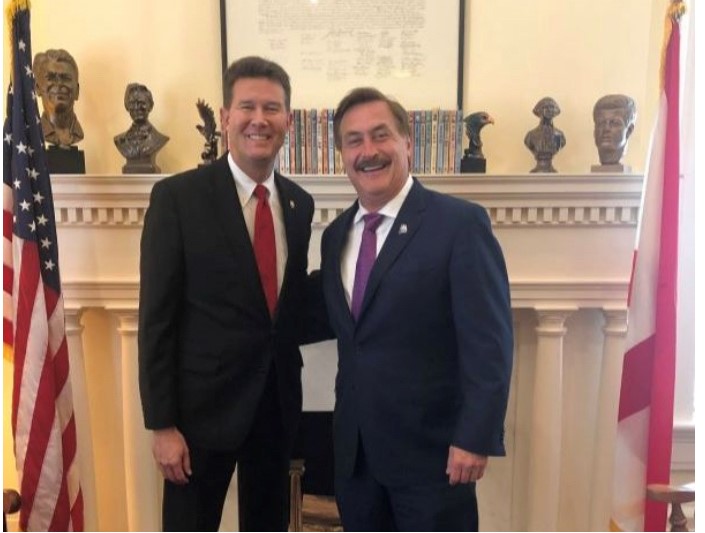
Friday, Montgomery Judge Greg Griffin issued an order dismissing a lawsuit seeking to block the use of vote counting machines in the November 8 general election. Alabama Attorney General Steve Marshall sought to dismiss the lawsuit against the state. The plaintiffs asked for a preliminary injunction to block the use of the vote counting machine. Judge Griffin allowed both sides to prevent evidence supporting their motions but ultimately found in favor of the State of Alabama. On Friday, Judge Griffin granted the State’s motion to dismiss the lawsuit and rejected the plaintiffs’ motion for a preliminary injunction to halt the use of the voting machines. “Plaintiffs’ suit is due to be DISMISSED, and the Plaintiffs’ Motion for Preliminary Injunction is due to be DENIED,” Judge Griffin wrote in his decision. “As to the Motion to Dismiss, this Court lacks subject matter jurisdiction because Plaintiffs have alleged only a speculative injury that does not support standing. The Court additionally lacks subject matter jurisdiction because Plaintiffs’ alleged injuries are neither traceable to nor redressable by Defendants, because sovereign immunity pursuant to § 14 of the Alabama Constitution bars this suit, and because the jurisdiction-stripping statute bars this suit. This Court holds that even if it were to reach the merits, it would find that Plaintiffs fail to state a claim. Plaintiffs’ Motion for Preliminary Injunction is denied as moot. This Court finds that if it reached the Motion for Preliminary Injunction, it would be denied because Plaintiffs failed to meet the four required elements of a party seeking a preliminary injunction to which no preliminary injunction can issue. Plaintiffs have a higher burden than usual because they seek a mandatory preliminary injunction that would change the status quo.” “Plaintiffs fail to establish irreparable harm because their alleged injury is speculative,” Griffin wrote in his final judgment. “Further, the named Plaintiffs have failed to offer any testimony—whether by declaration or live at the hearing—to substantiate any allegations regarding their own circumstances. And without such evidence, Plaintiff has not met their burden to show that they themselves would suffer immediate and irreparable injury. Additionally, Plaintiffs have not shown that they are likely to prevail on the merits, and they have not shown that the balance of equities weighs in their favor given the significant financial and administrative burdens that their requested relief would impose and given that the 2022 General Election is only 59 days away.” Judge Griffin dismissed the case with prejudice. The case was brought by former Republican gubernatorial candidate Lynda Blanchard, State Rep. Tommy Hanes, Focus on America, and Dr. David Calderwood. Blanchard dropped out of the case and was replaced by former Alabama Governor Don Siegelman. The case was supported by lawyers for Mike Lindell. The My Pillow founder and CEO has claimed that the 2020 presidential election was stolen from then President Donald J. Trump. Blanchard said that she supported “the whole Republican ticket” and that the case was being used to promote write-in campaigns. Both Dean Odle and Jared Budlong are running write-in campaigns. Alabama Today spoke with Alabama Secretary of State John H. Merrill, the lead defendant in the case, following the Judge’s ruling. “28 and 0,” Merrill said, referring to the number of court challenges that the Secretary of State’s office has defeated in his tenure as Secretary of State. “This proves once again that we have the most dependable, the most reliable, and the most accountable election system in the country, and that has been verified by three different independent groups as well as by the courts. The only people who have not accepted that are those groups who have agendas to promote.” The state will use vote counting machines in the November 8 general election. To connect with the author of this story, or to comment, email brandonmreporter@gmail.com.
Lindy Blanchard supports full Republican ticket in first public statement since May election
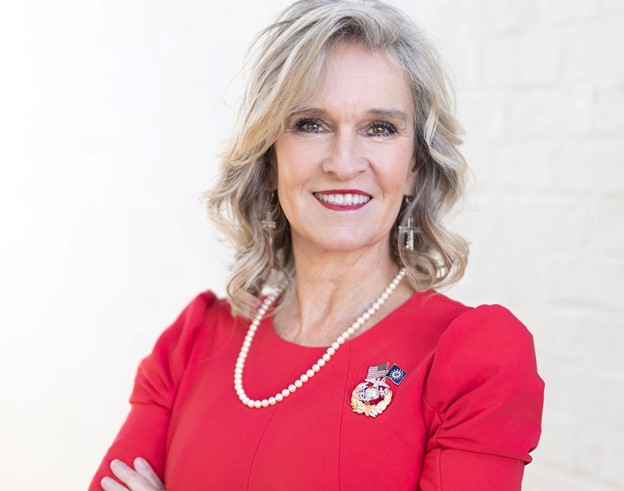
Lindy Blanchard issued a statement today regarding her recent withdrawal from litigation that challenges the integrity of Alabama’s electric voting machines. Blanchard withdrew from the lawsuit she helped file due to “write-in campaigns connected to the lawsuit.” The lawsuit is supported by My Pillow founder and CEO Mike Lindell. Former Gov. Don Siegelman has taken Blanchard’s place in the lawsuit. Blanchard and State Rep. Tommy Hanes originally brought the lawsuit. The candidates had originally sought to bar the use of the vote tabulation machines in the May 24 Republican primary. Blanchard finished second to incumbent Gov. Kay Ivey, but Ivey received 54.8% of the vote in the primary, enough to avoid a Republican primary runoff. In a statement on Facebook, Lindy threw her full support behind the Republican party and explained why she withdrew from the lawsuit. “Keeping our elections secure should be a top priority for every American. After witnessing the voting fiasco in 2020, when elections were inaccurate in many states, I decided to join in a Mike Lindell-sponsored lawsuit against Alabama’s Secretary of State’s Office for using electronic voting machines which were allegedly not secure. I recently made the difficult decision to remove myself from the lawsuit because of the write-in campaigns connected to the lawsuit.” Blanchard expressed the need for election integrity and emphasized the need for all Republicans to vote for Republicans in all elections. “However, the integrity of our nation is at stake. I look forward to working together with positive dialogue and action toward securing our elections. As a Republican candidate who ran for Governor and came in second place, I wholeheartedly support the Republican ticket. I ask all conservatives and Republicans to vote for the Republicans in each race. We must not open the door for any other party that does not support our conservative values,” Blanchard concluded. Recently, the Libertarian Party of Alabama (LPA) successfully turned in a petition with 51,588 signatures in May in order to achieve party status in Alabama and for their candidates to be on the ballot. This is the first time in 20 years that the party is on the general election ballot in Alabama, which gives voters an opportunity to choose candidates outside of the Democratic and Republican parties.
Katie Britt’s SGA presidential past brought into question
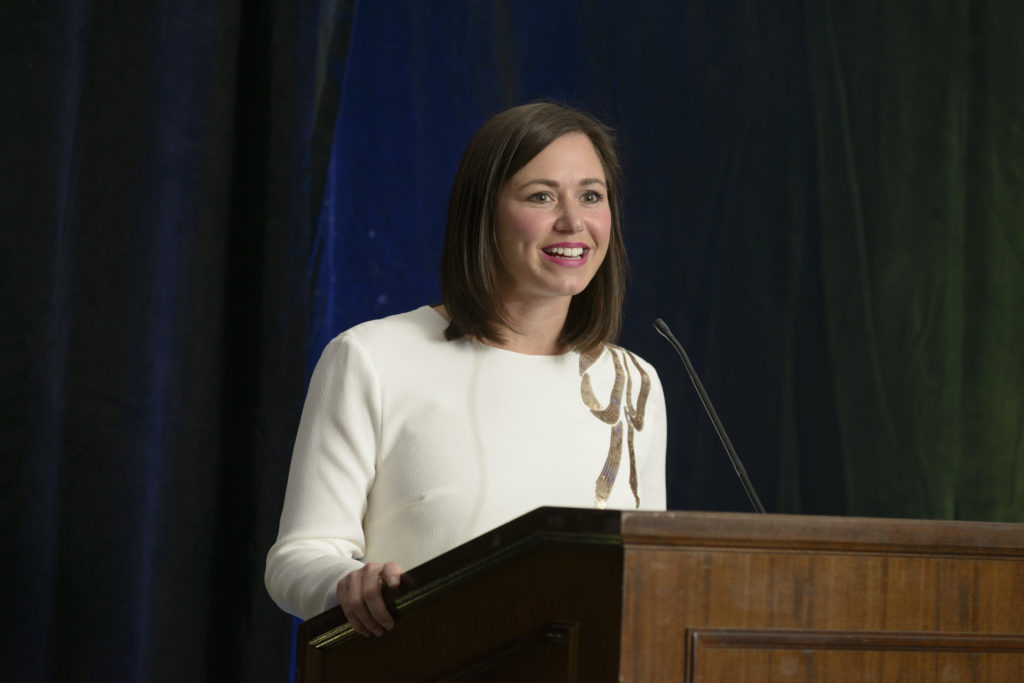
In recent months, Katie Britt’s past leadership role in the University of Alabama Student Government Association has come into question as the hard-fought Senate election draws to a close. A recent report from 1819 News brings about the question: Should a U.S. Senate candidate or any other candidate seeking higher office have to answer for their past student government record? The SGA has served as a starting point for many of Alabama’s leaders, including Jim Zeigler, John Merrill, and Don Siegelman. Britt served as Alabama’s SGA president during the 2003-2004 academic school year. In October 2003, during Britt’s tenure, the SGA Senate passed a resolution urging the University’s Russell Student Health Center to offer the so-called morning-after pill. It was passed unanimously. However, it was later met with pushback from some students. Then student Joshua Taylor commented in an article from the school newspaper, the Crimson White, “I do not believe the University of Alabama as an educational institution should be distributing the morning after pill. A public-funded institution does not have the ability to decide where life begins.” The controversy with Britt’s participation in this issue stems from the question of whether Britt had veto powers and could have attempted a veto of the SGA Senate’s resolution calling on the University’s health center to offer the morning-after pill but chose not to. According to the report, two weeks after the morning-after pill unanimous resolution, she used that power to veto an SGA Senate parking resolution calling for a one-ticket limit per 24-hour period. Opponents quickly questioned her ability to veto the resolution. In February 2004, while Britt was still SGA president, the Crimson White investigated the veto question, which stemmed from her earlier veto of the SGA Senate’s parking resolution. The question remained unanswered for years until the SGA Constitution finally stated that resolutions were not subject to presidential vetos. Britt responded to questions about her time in the SGA, dismissing the resolution as something “she had no control of.” “As a Christian, conservative wife and mother, I am proud to be 100% pro-life. Both my faith and the science tell me that life begins at conception, and I’ll fight tirelessly to protect life in the Senate,” Britt said in a statement to 1819 News. “Over 63 million innocent unborn babies have been murdered in America since the disastrous Roe v. Wade decision in 1973, and my family and I are praying that the Supreme Court finally overturns Roe this year and allows states like Alabama to defend life. “As far as my time in college goes 20 years ago, I will admit to learning and singing every single word of the Auburn fight song. And, like Justice Kavanaugh, I might have even had the opportunity to enjoy a beer or two along the way — but only after I turned 21,” Britt continued. “I am sure there are also a laundry list of things that happened on campus while I was SGA president that I had no control of. At the end of the day, I’m proud to say I was an active leader in our College Republicans chapter back then. I was raised in a Christian, conservative household in Enterprise, Alabama, and that’s how my husband and I are raising our two children. If this is how low my opponents are stooping and how far they’re stretching, I must be doing something right.”
Alabama House committee advances lottery bill

An Alabama legislative committee advanced a lottery proposal Thursday as proponents try to get the issue before voters for the first time since 1999. The House Tourism and Economic Development Committee approved the proposed constitutional amendment and related enabling legislation. The bills now move to the full House of Representatives. Alabama is one of five states without a state lottery. Republican Rep. Chip Brown, the bill’s sponsor, said it is the top issue he and other lawmakers get asked about in their districts. He said many Alabamians now drive across state lines to buy tickets. “The people of Alabama have been playing the lottery for years. We’ve just been playing it in other states. So it’s time we kept that money in-state and helped out the children of the state of Alabama,” Brown told reporters. The measure faces a short window to win final approval with just seven meeting days remaining in the legislative session. Brown said he hoped for a vote in the final week of March when lawmakers return from spring break. House Speaker Mac McCutcheon said he first wants assurances that supporters have the needed 63 votes for passage before bogging down one of the final legislative days with the lengthy debate. He asked members to spend spring break talking with constituents and colleagues to determine the level of support. “We’ve got to see where the votes are,” McCutcheon said. Lottery proceeds would be used primarily to provide scholarships to help families pay a portion of tuition at two and four-year colleges. The two-year scholarships would be capped at $2,500 or less. The amount of the four-year scholarships would be determined based on lottery proceeds and the number of eligible recipients. The Legislative Services Agency estimated a lottery would generate $198 million to $285 million annually after paying prizes and expenses. Rep. Neil Rafferty, a Democrat from Birmingham, told Brown he wanted to make sure low-income families are receiving an equitable share of the benefits from lottery proceeds. “It is usually not wealthy people that are participating in the lottery. If we are going to do the lottery, we ought to do it right, and I would want equity in that,” Rafferty said. The committee approval came after a brief public hearing in which two opponents spoke against the proposal. Joe Godfrey, executive director of the Alabama Citizens Action Program, told the committee lottery benefits will be fueled by tickets bought by low-income Alabamians. “Wealthy people don’t buy lottery tickets. This is coming out of the pockets of the poor,” Godfrey said. If approved by three-fifths of lawmakers, the lottery proposal would go before voters in November. The House lottery bill advanced as a separate proposal that would allow a lottery and eight casinos with table games has so far stalled in the Alabama Senate amid longstanding divisions over which sites and entities would hold the casino licenses. Alabama is just one of five states — along with Nevada, Utah, Alaska, and Hawaii — without a state lottery. State voters in 1999 rejected a lottery proposed by then-Gov. Don Siegelman. Since then, efforts to create a state lottery or allow casinos have failed under a fatal mix of conservative opposition to legalized gambling and turf wars over who could operate lucrative electronic gambling machines. “We’ve been talking about this ever since 1999. It’s time for the citizens of this state to decide whether they want a lottery or not,” Rep. Berry Forte, a Democrat from Eufaula, said during the committee debate. Republished with the permission of the Associated Press.
Alabama tourism committee advances lottery and casino bill

An Alabama legislative committee swiftly advanced lottery and casino legislation on Wednesday, acting after a public hearing dominated by opponents who said the proposal would hand the licenses to a few powerful operators. The Senate Tourism Committee voted for the proposed constitutional amendment authorizing a state lottery, sports betting, eight full casinos with slots and table games, and two smaller gambling sites that could have up to 300 slot machines each. It now moves to the Senate floor. Republican Sen. Greg Albritton, the sponsor of the proposal, told the committee it was time for the state to address the issue of gambling. He argued his bill would give Alabamians a much-wanted state lottery and “grab control” of gambling by allowing a limited number of casino sites. “The people have been ready for this vote for years,” Albritton said of the proposal, which would go to a statewide vote in November if approved by lawmakers. Opponents argued that the bill would essentially hand the licenses to a few select operators. The casinos would be located at existing state dog tracks and sites owned by the Poarch Band of Creek Indians. “We shouldn’t be, as a Legislature, in the posture of picking winners and losers,” Rep. Kelvin Lawrence, a Democrat from Hayneville, told the committee. He said it would close an existing facility in his county by limiting the number of machines. Those speaking against the bill in the public hearing included both longtime opponents of legalized gambling and representatives of existing electronic bingo operations that would likely be shuttered under the proposal. Casinos would be located at the site of four existing dog tracks in Greene, Jefferson, Macon, and Mobile counties. The Poarch Band of Creek Indians would have a casino at each of the three tribal sites as well as a new location located in either DeKalb County or Jackson County. The licenses at the track locations would be competitively bid, although the track owners would have the opportunity to come in and make a final bid for the license. It would authorize two smaller satellite operations in Houston and Lowndes counties with up to 300 slot machines each. “The competitive bid process that it mentions in this piece of legislation is actually more of a rigged bid process because the current owner is given the opportunity to offer one dollar over the winning bid to secure the license at the end of the day,” Heather Coleman Davis, a lobbyist representing another Greene County operation, told the committee. The proposal would require a change to the Alabama Constitution. It must be approved by three-fifths of lawmakers and then a majority of state voters to take effect. The gambling proposal, along with a companion bill to create a state gaming commission and operating rules, now goes to the Alabama Senate, where similar legislation was approved last year. Tourism Committee Chairman Del Marsh urged the House of Representatives to take up the proposal if it is approved by the Senate. He said it is the top issue he is asked about when he goes home to his Anniston district. “I think the people of this state want to have something to vote on and make a decision on,” Marsh said. Alabama is just one of five states — along with Nevada, Utah, Alaska, and Hawaii — without a state lottery. State voters in 1999 rejected a lottery proposed by then-Gov. Don Siegelman. Since then, efforts to legalize casinos or create a state lottery have failed under a fatal mix of conservative opposition to legalized gambling and turf wars over who could operate lucrative electronic gambling machines. Albritton has previously acknowledged that it would be difficult to pass legislation that just put the licenses out for bid. The existing facilities carry political clout and support from local legislators who don’t want to see local jobs disappear. Republished with the permission of the Associated Press.
State lottery, casino bill proposed in Alabama Legislature

An Alabama lawmaker on Thursday introduced a proposal to create a lottery and allow multiple casinos, as well as sports betting, in the state, but the bill faces a ticking legislative clock and long-term divisions that have sunk previous gambling proposals. “It’s time Alabama got in the game,” Republican Sen. Greg Albritton said at a news conference. Albritton said the state is missing out on hundreds of millions of dollars in revenue each year. “We need to take action on this now,” he said. “Waiting another year is not going to help us.” The bill introduced Thursday would create a state lottery with proceeds going to fund college scholarships and other education needs. It would also authorize eight casinos with table games and online sports betting at sites owned by the Poarch Band of Creek Indians and at existing dog tracks. It would also authorize two smaller operations with up to 300 slot machines. Four casinos would be located at the site of existing dog tracks: Greenetrack in Greene County, the Birmingham Race Course in Jefferson County, VictoryLand in Macon County, and the Mobile County Greyhound Racing facility in Mobile County. The licenses would be competitively bid, although the track owners would have the opportunity to come in and make a final bid for the license. A fifth casino operated by the Poarch Band of Creek Indians would be located in either DeKalb County or Jackson County. The tribe, under federal law, would also be allowed table games at its three existing locations. Two smaller sites — one in Lowndes County and one in Houston County — would be allowed to operate a limited number of electronic gambling machines. Rep. Kelvin Lawrence, a Democrat from Hayneville, said the bill would likely lead to the closure of both existing electronic bingo facilities in Lowndes County. A single site in the county could have up to 300 gambling machines under the proposal. “It’s just an effort to appease us, but it basically puts us on life support. … We’re talking about a community that is underprivileged, 90% poverty. It would be a catastrophe if those facilities are closed,” Lawrence said. If approved by lawmakers, the proposal would go before voters in November. Albritton said he wants a committee vote on the proposal Tuesday. However, there are 12 meeting days remaining in the 30-day regular legislative session, giving the measure a small window to win approval. “We’ll have to see how the body reacts to the work that he’s done in regard to this very important issue,” Senate President Pro Tempore Greg Reed said when asked about the bill’s chances. The latest bill is similar to one state senators approved last year, but the measure failed in the Alabama House of Representatives. Alabama is just one of five states — along with Nevada, Utah, Alaska, and Hawaii — without a state lottery. Voters in 1999 rejected a lottery proposed by then-Gov. Don Siegelman. Since then, efforts to legalize casinos or create a state lottery have failed under a fatal mix of conservative opposition to legalized gambling and turf wars over who will get the licenses for the lucrative games. Republished with the permission of the Associated Press.
Hubbard apologizes, seeks early release from prison
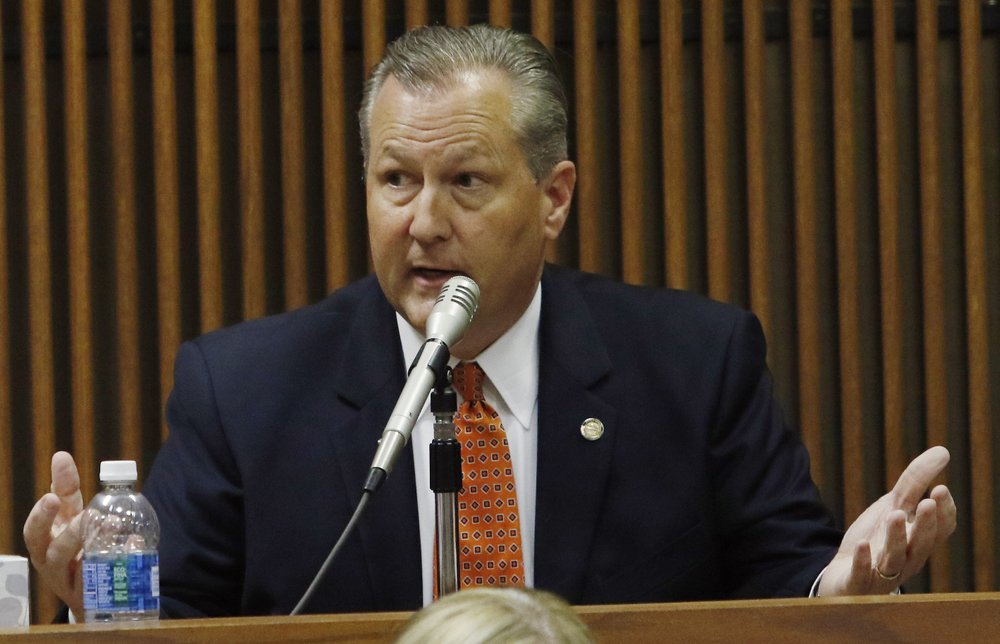
Former House Speaker Mike Hubbard in a Friday court filing apologized for his ethics conviction that he said hurt the state and his family as his attorney filed a request for his early release after serving one year of a 28-month sentence. Hubbard’s attorney argued his sentence of over two years behind bars is out of line with punishments handed down to other officials convicted of violating the state ethics law. In a letter to the judge, Hubbard wrote that “I recognize and admit my errors” and apologized to the people of the state and others. “My conviction has severely damaged and embarrassed me and my family, friends, former constituents, community, church, the legislature, and the state of Alabama. For this, I am severely sorry and respectfully ask forgiveness from everyone affected,” Hubbard wrote in the letter to Lee County Circuit Judge Jacob Walker. He wrote that it was embarrassing to be convicted of violating an ethics law he oversaw being drafted and approved by lawmakers. Whether a criminal defendant has accepted responsibility and expressed remorse is often a factor when a judge weighs a request for leniency. A jury in 2016 convicted Hubbard of violating the state ethics law, including using his public office for personal financial gain. Prosecutors accused Hubbard of leveraging his powerful public office to obtain clients and investments for his businesses, violating the prohibition against giving a “thing of value” to an elected official. His defense maintained the contracts were legitimate work and unrelated to his position as House speaker. In upholding the conviction this spring, justices noted that when contacting a company for one client, Hubbard “identified himself as a state legislator and as Speaker of the House of Representatives.” They also noted how one company executive wrote in an email that Hubbard could get the company, “in front of any speaker in the country regardless of party.” The Republican was one of the state’s most powerful politicians until the ethics conviction in a corruption case ended his political career. Hubbard, the architect of the GOP’s takeover of the Alabama Legislature in 2010, was a legislator from Auburn and former chairman of the Alabama Republican Party. He was elected House speaker soon after Republicans won control of both legislative chambers. Hubbard was automatically removed from office after his 2016 felony conviction. Hubbard was originally sentenced to 48 months behind bars, but that was reduced after some counts against him were overturned on appeal. His attorney argued the 28-month sentence is well “outside the overwhelming majority of the similarly-situated individuals” that have been convicted in state court of state ethics violations, and listed sentences of other elected officials convicted in state court. However, former Gov. Don Siegelman served six years in federal prison after being convicted in 2006 on charges that he sold a seat on a state regulatory board to HealthSouth founder Richard Scrushy in exchange for $500,000 in donations to Siegelman’s signature political issue — his 1999 campaign to establish a state lottery. Siegelman was convicted on a separate obstruction of justice charge that he tried to hide money he received from a lobbyist. Siegelman was released in 2017. He has regained his law license and says he plans to focus on criminal justice issues. Republished with the permission of the Associated Press.


